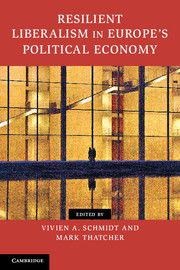Book contents
- Frontmatter
- Contents
- List of figures
- List of tables
- List of contributors
- Preface
- 1 Theorizing ideational continuity: The resilience of neo-liberal ideas in Europe
- Part I Economy, state, and society
- 2 Neo-liberalism and fiscal conservatism
- 3 Welfare-state transformations: From neo-liberalism to liberal neo-welfarism?
- 4 The state: The bête noire of neo-liberalism or its greatest conquest?
- Part II Neo-liberalism in major policy domains
- Part III Neo-liberalism in comparative perspective
- Part IV Conclusion
- Index
- References
3 - Welfare-state transformations: From neo-liberalism to liberal neo-welfarism?
Published online by Cambridge University Press: 05 June 2014
- Frontmatter
- Contents
- List of figures
- List of tables
- List of contributors
- Preface
- 1 Theorizing ideational continuity: The resilience of neo-liberal ideas in Europe
- Part I Economy, state, and society
- 2 Neo-liberalism and fiscal conservatism
- 3 Welfare-state transformations: From neo-liberalism to liberal neo-welfarism?
- 4 The state: The bête noire of neo-liberalism or its greatest conquest?
- Part II Neo-liberalism in major policy domains
- Part III Neo-liberalism in comparative perspective
- Part IV Conclusion
- Index
- References
Summary
Introduction
What has been the influence of the neo-liberal ideology on welfare-state transformations since the 1980s? How resilient is such ideology and what is its influence today – that is, in the early 2010s? In the context of this book's themes, we would expect to find in this policy area a high degree of influence and resilience. After all, neo-liberalism emerged as an attack on Big Government, with a view to rescuing individual freedom from the torments of taxation, bureaucracy, and regulation (including in the social realm). This chapter recognizes the high relevance (and not only rhetorical) of neo-liberalism for welfare-state developments since the 1980s – but with two decisive qualifications. The first has to do with meanings: gauging neo-liberal resilience requires a prior clarification of what is connoted by the term ‘neo-liberalism’. The second qualification has to do with timing: I argue that the influence of neo-liberalism on the welfare state has followed a broad parabola, which reached its peak in the early 1990s but started to decline thereafter in the wake of ideological changes and discursive reorientations.
I start with the meaning attributed to the term ‘neo-liberalism’ and, more precisely, to both the noun (liberal) and the prefix (neo). Unfortunately, the English language conflates in the noun three connotations that Italian (and Italy's political-theory tradition) separates by using different nouns. The Italian language, in fact, distinguishes among liberalesimo, liberalismo, and liberismo. The first term has the widest connotation: It refers to the entire, complex, and diverse thought tradition that began with the philosophical contractualism of John Locke and with the doctrines about the constitutional protection of individual freedoms. Liberalesimo thus embraces the entire range of offspring that ‘germinated’ from the Lockean core: its outer perimeter ends where authoritarianism and collectivism begin and the ideas of negative freedom, its constitutional protection, and its lexicographic primacy are rejected.
- Type
- Chapter
- Information
- Resilient Liberalism in Europe's Political Economy , pp. 77 - 111Publisher: Cambridge University PressPrint publication year: 2013
References
- 10
- Cited by

